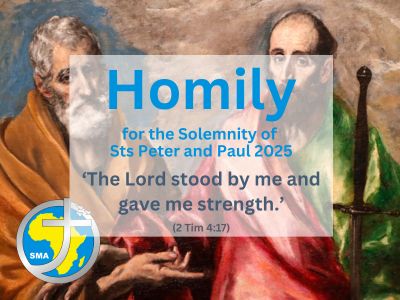Readings: Acts 12:1-11; 2 Timothy 4:6-8,17-18; Matthew 16:13-19
Theme: ‘The Lord stood by me and gave me strength’ (2 Tim 4:17)
By Michael McCabe, SMA
Today we celebrate the feast of two pillars of the Church, saints Peter and Paul. Very different characters, both were transformed by their encounter with the Lord and united in their witness to him. Peter, a fisherman from Bethsaida in Galilee, was chosen by Jesus as leader of the apostles and the ‘rock’ on which he would build his church. Paul, a devout and zealous Pharisee from Tarsus in Asia Minor (modern day Turkey) was chosen by the risen Christ to bring the gospel to the Gentiles (non-Jewish peoples).
Our Gospel today recounts Simon’s (Peter) confession that Jesus is ‘the Christ, the Son of the living God’ (Mt 16:15). Simon was never afraid to speak up and say what he thought even when his companions were reduced to silence. Acknowledging the divine inspiration behind Simon’s words Jesus replies: ‘You are Peter (giving him a new name by which he would henceforth be known) and on this rock I will build my Church, and the gates of the underworld shall not prevail against it’ (Mt 16:18). What an awesome promise, a promise we easily forget when we see the Church mired in scandals of its own making!
Despite his obvious leadership qualities, Peter was far from perfect. He tried to prevent Jesus taking on the mantle of a suffering Messiah and enduring the Cross. He ends up deserting Jesus and even denying him three times. Following his denial we might well consider Jesus fully justified in transferring the role of leadership from Peter to John, the faithful and beloved disciple. But he doesn’t do that. Neither does he ignore Peter’s failure to stand by him in his darkest hour. Instead he gives him the opportunity to profess his love for him. ‘Do you love me?’ he asks Peter, not once but three times – one question for each of Peter’s denials. Three times Peter gives the same answer, ‘Yes, Lord; you know that I love you’ (Jn 21:16). Undoubtedly, Jesus did know that Peter loved him. He knew and understood Peter far better than Peter understood himself. He knew his strengths and weaknesses. It was for Peter’s sake that Jesus asked him to express his love three times. With each question and answer Jesus is drawing Peter away from his past failures and freeing him to take up his new role as leader of the renewed community of disciples. ‘Feed my lambs; feed my sheep’ (Jn 21: 16-17).
The story of Peter’s confirmation as leader of Jesus disciples shows us that the way Jesus works is through forgiveness and reconciliation. It also reminds us that the Church is not a community of perfect disciples but of forgiven sinners unworthy of the task confided to them by the Lord. As we join with Peter in professing our love for Jesus, let us never forget that we carry the treasure of the gospel in ‘earthen vessels’ and that, no matter how often we fail, Jesus never withdraws his love from us.
Let us now turn our attention to Paul, perhaps the greatest missionary of all time. Lives of Paul portray him as the tireless voyager, bearing the new faith to the farthest corners of the known world. The greater part of The Acts of Apostles is devoted to the missionary journeys of Paul. Luke presents him as initiating a new age in mission: the age that takes the Gospel beyond the rather confined circle of the apostles and gives concrete expression to its universal relevance. It was Paul who sowed the seeds of Christian faith in many of the great centres of the Roman civilisation of his day. But that was only one side of Paul. He was also a man acquainted with suffering. From his personal experience Paul came to realise that the following of Christ did not mean the elimination of weakness and suffering, but rather, the manifestation of divine power at the heart of weakness.
Suffering, for Paul, was not something to be endured passively. It was part and parcel of what it meant to be a missionary, to live in imitation of Jesus who suffered and died on the Cross. Hence Paul bears in his body ‘the works of Jesus’ (Gal 6:17). He shares in Christ’s sufferings (2 Cor 1:5) and is happy ‘to make up all the hardships that still have to be undergone by Christ for the sake of his body, the Church’ (Col 1:24). In Acts, Luke balances Paul’s active proclamation of the gospel (chapters 13-20) with his three years of captivity (chapters 21-28). This latter period, far from being irrelevant to Paul’s mission and the growth of the Church are, in the words of Lucien Legrand. ‘the most important period of Paul’s entire ministry.’ It is through the sufferings of his captivity that Paul fulfils his missionary calling, so that he can say, in the words of today’s second reading, ‘I am already being poured out like a libation, and the time of my departure is at hand. I have fought the good fight to the end; I have run the race to the finish’ (2 Tim 4:6-7). By his suffering, Paul, like Jesus, entered into the mystery of pure divine power ‘made perfect in weakness’ (2 Cor 12: 9). May the example of Saints Peter and Paul inspire us to be faithful and courageous in sharing the Gospel with others, always conscious that we carry this treasure ‘in earthen vessels’ (2 Cor 4:7).
Listen to an alternative audio Homily by Tom Casey, SMA:

